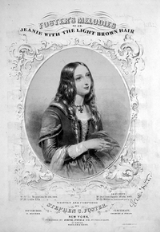
Jeanie with the Light Brown Hair
Encyclopedia
"Jeanie with the Light Brown Hair" is a parlor song by Stephen Foster
(1826-1864). It was published by Firth, Pond & Co. of New York in 1854. Foster wrote the song with his wife Jane McDowell in mind. "Jeanie" was a notorious beneficiary of the ASCAP boycott
of 1941. During this period, most modern music could not be played by the major radio broadcasters due to a dispute over licensing fees. The broadcasters used public-domain songs during this period, and according to Time
magazine, "So often had BMI
's Jeannie [sic] With the Light Brown Hair been played that she was widely reported to have turned grey." The song's ubiquitous airplay in the 1940s led Spike Jones
to create a parody, called "I Dream of Brownie with the Light Blue Jeans". In the song, it turns out that "Brownie" is a wire-haired terrier. The instrumental interlude contains a number of references to other Stephen Foster songs.
Stephen Foster
Stephen Collins Foster , known as the "father of American music", was the pre-eminent songwriter in the United States of the 19th century...
(1826-1864). It was published by Firth, Pond & Co. of New York in 1854. Foster wrote the song with his wife Jane McDowell in mind. "Jeanie" was a notorious beneficiary of the ASCAP boycott
ASCAP boycott
The ASCAP boycott was a boycott of ASCAP by radio broadcasters due to license fees.Between 1931 and 1939, ASCAP increased roayalty rates charged to broadcasters some 448%. In 1941, when ASCAP tried to double its license fees, radio broadcasters formed a boycott of ASCAP and founded a competing...
of 1941. During this period, most modern music could not be played by the major radio broadcasters due to a dispute over licensing fees. The broadcasters used public-domain songs during this period, and according to Time
Time (magazine)
Time is an American news magazine. A European edition is published from London. Time Europe covers the Middle East, Africa and, since 2003, Latin America. An Asian edition is based in Hong Kong...
magazine, "So often had BMI
Broadcast Music Incorporated
Broadcast Music, Inc. is one of three United States performing rights organizations, along with ASCAP and SESAC. It collects license fees on behalf of songwriters, composers, and music publishers and distributes them as royalties to those members whose works have been performed...
's Jeannie [sic] With the Light Brown Hair been played that she was widely reported to have turned grey." The song's ubiquitous airplay in the 1940s led Spike Jones
Spike Jones
Mel Blanc, the voice of Bugs Bunny and other Warner Brothers cartoon characters, performed a drunken, hiccuping verse for 1942's "Clink! Clink! Another Drink"...
to create a parody, called "I Dream of Brownie with the Light Blue Jeans". In the song, it turns out that "Brownie" is a wire-haired terrier. The instrumental interlude contains a number of references to other Stephen Foster songs.

